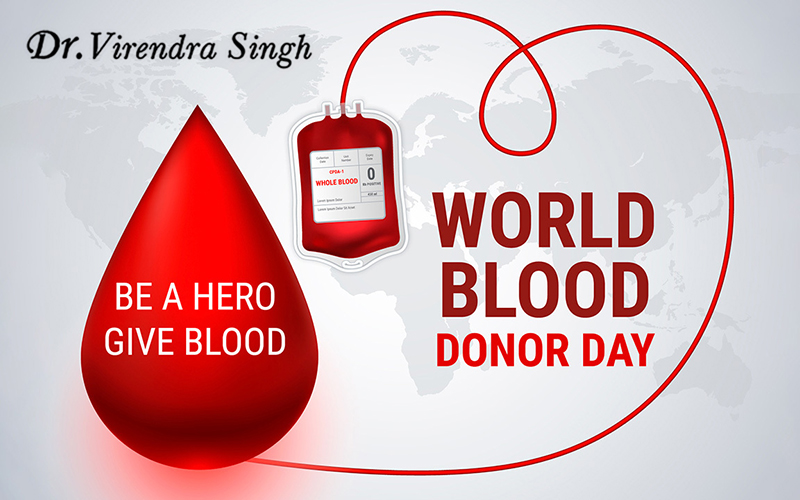
World Blood Donor Day is a global celebration that takes place on 14th June each year. It’s an exceptional opportunity to express gratitude to and show appreciation to voluntary blood donors everywhere for their altruistic act of giving. The day also highlights the importance of achieving universal access to safe blood transfusion. Every donation of blood is priceless and has the power to save lives. Establishing a safe and dependable blood supply system that can satisfy patient’s continuous requirements requires promoting repeat donations. By promoting regular blood donation, we can ensure a safe and sustainable blood supply for those in need.
Dr. Virendra Singh is a passionate advocate for blood donation and has provided invaluable guidance for World Blood Donor Day 2024. His extensive research and dedication to improving global blood donation practices have significantly impacted the medical community. Dr. Virendra Singh emphasizes the critical need for a consistent and safe blood supply to save lives, especially in emergencies and for patients with chronic Illnesses. He promotes greater understanding and instruction regarding the significance of routine blood donations, emphasizing the fact that a single donation can save many lives.
The Theme For World Blood Donor Day 2024
The theme for World Blood Donor Day 2024 is “Give blood and keep the world-beating”. The theme highlights the value of blood donors and their roles in promoting health and saving lives. Regardless of the final theme, Blood Donor Day 2024 offers a significant platform to:
- Raise Awareness: Bringing attention to the vital role that blood donations play in healthcare and encouraging others to donate.
- Promote Gratitude: Expressing gratitude and honoring the selflessness of current blood donors.
- Advocate For Change: Encouraging financial investments in the accessibility and infrastructure of blood banks.
- Combat Misinformation: Educating the public about safe blood donation practices.
History of World Blood Donor Day
- The World Health Organization (WHO) created World Blood Donor Day in 2004 to honor voluntary blood donors everywhere and to increase public awareness of the value of safe blood donation.
- Karl Landsteiner, the Nobel Prize winner who established the ABO blood group system, was born on June 14th, and this date was selected to honor him.
- In 2005, the 58th World Health Assembly established Blood Donor Day as an annual global event.
- World Blood Donor Day was first recognized on June 14, 2005, and it has been remembered yearly ever since to raise awareness of the need for safe blood and blood products for transfusions as well as to encourage voluntary, unpaid blood donation.
Significance of World Blood Donor Day
The purpose of World Blood Donor Day is to increase public awareness of the vital role that voluntary blood donation plays and the effects that it has on healthcare systems around the globe.
- Promotes voluntary blood donation.
- Recognizes and values blood donors.
- Increases understanding of the need for safe blood and blood products.
- Encourages regular blood donation.
- Supports national blood services and initiatives.
- Advocates for universal access to safe blood.
- Mobilizes funding and support for programs promoting blood donation.
- saves lives by charitably giving blood.
Overall, World Blood Donor Day is essential for encouraging voluntary blood donation, guaranteeing the supply of safe blood, and preserving lives via the selfless act of blood donation. It aims to inspire individuals, communities, and organizations to actively contribute to building a sustainable blood supply and improving healthcare services worldwide.
Fascinating Facts About Blood
1. The Composition
Blood is a complicated mixture consisting of 45% formed components and 55% plasma, primarily:
-
- Red Blood Cells (Erythrocytes): These carry carbon dioxide out of the lungs and oxygen into the tissues. They are devoid of nuclei but are endowed with hemoglobin, the red protein that gives blood its hue.
- White Blood Cells (Leukocytes): These are the defense mechanisms of our body, battling illnesses and viruses. They have different kinds and specialized uses.
- Platelets (Thrombocytes): These assist seal wounds and prevent bleeding by forming clots.
2. Fun Facts
- An adult human has about 5 Liters (a little over 1 gallon) of blood.
- Our body produces and eliminates millions of red blood cells daily.
- A blood cell can move through your body in 20 to 60 seconds at its fastest.
- Globally, blood type O positive is the most prevalent, and blood type AB negative is the least frequent.
- Humans share about 50% of their genes with bananas, but our blood is too different for transfusions.
3. The Importance of Blood
- To keep us alive and functional, blood carries hormones, nutrition, waste products, and oxygen throughout the body.
- It regulates our body temperature and assists fight infections.
- Blood donations are vital for saving lives in accidents, surgeries, and illnesses.
14th June 2024 Special Day
14th June carries global health significance as WHO commemorates World Blood Donor Day in 2024. This annual celebration, which honors selfless blood donors and promotes access for all, appropriately falls in early summer, when supplies tend to run low. The unique timing offers a perfect opportunity to raise awareness of the importance of safe blood transfusions. On this specific occasion in 2024, communities and health organizations worldwide will come together to honor altruistic blood donors for their life-saving contributions.
FAQs
What is World Blood Donor Day?
World Blood Donor Day is an annual event celebrated on June 14th to raise awareness about the importance of blood donation and to thank voluntary blood donors for their life-saving gifts. The day also hopes to inspire more people to donate blood regularly.
Why is blood donation important?
Blood donation is crucial because it helps save lives. Donated blood is utilized for many medical procedures, such as cancer treatment, trauma care, surgeries, and the treatment of chronic disorders including hemophilia and sickle cell anemia. A single blood donation can potentially save up to three lives.
Who can donate blood?
Blood can be donated by anyone who is generally in good health, weighs at least 110 pounds, and is at least 17 years old (or 16 with parental permission in some regions). It’s best to verify with your local blood bank for detailed requirements as eligibility standards can differ by nation and donation center.
Is blood donation safe?
Yes, blood donation is safe. Blood donation facilities employ single-use, sterilized needles as part of their stringent safety procedures for donors. Additionally, donors are examined for any medical issues that would make donation risky for either the donor or the receiver.
How can I get involved in World Blood Donor Day?
You can get involved in World Blood Donor Day by donating blood, organizing a blood drive, spreading awareness about the importance of blood donation, and thanking blood donors. Many organizations also host events and activities to celebrate the day, so look for local opportunities to participate.
